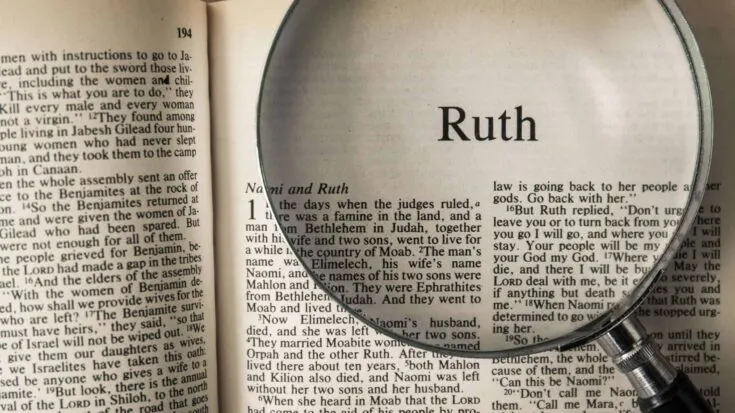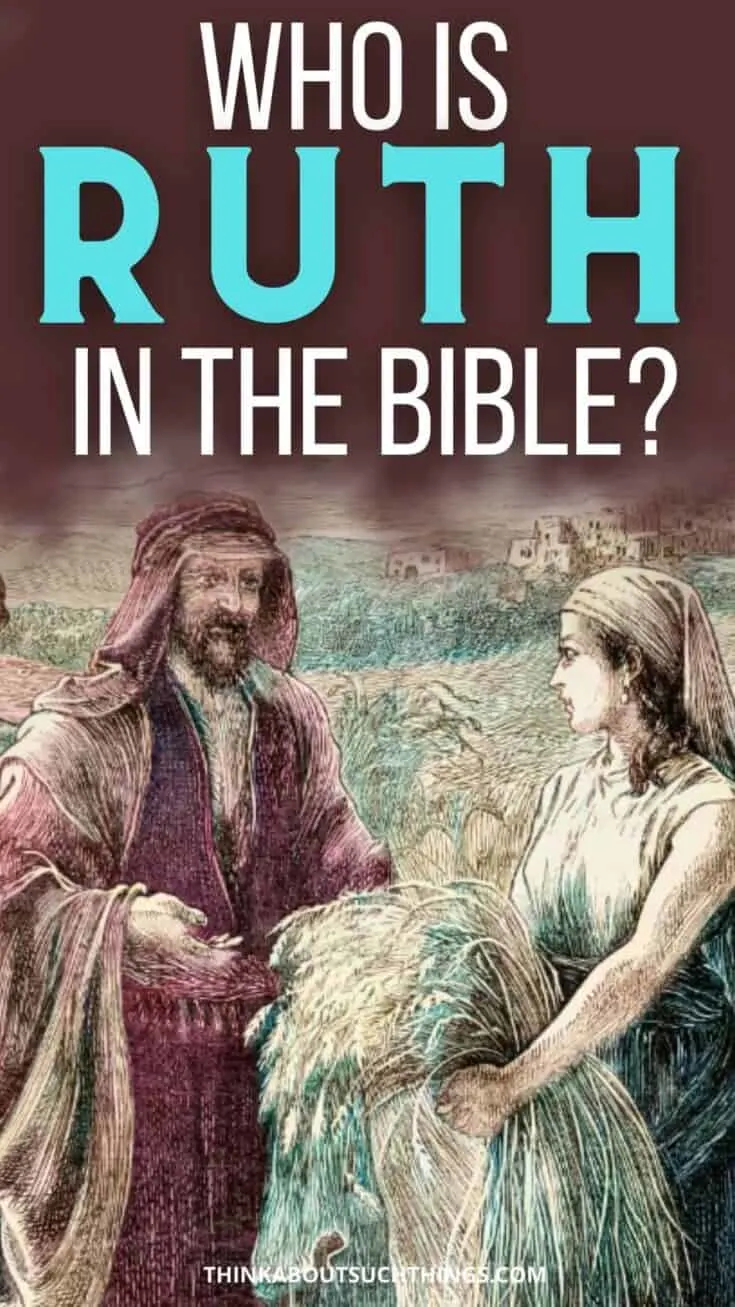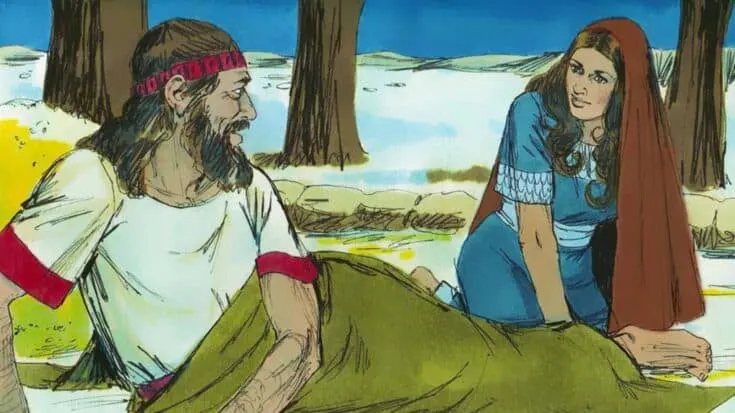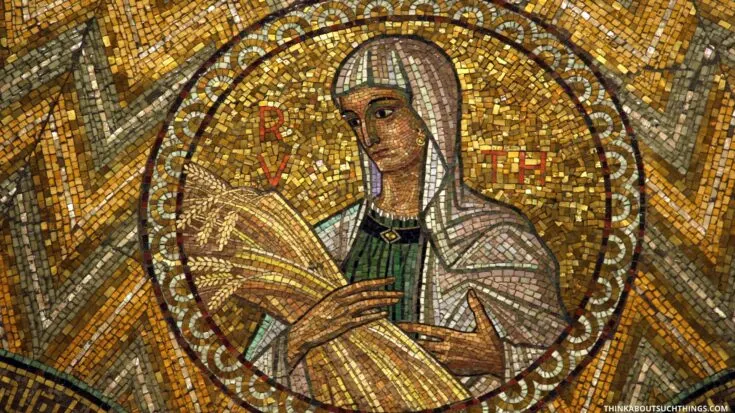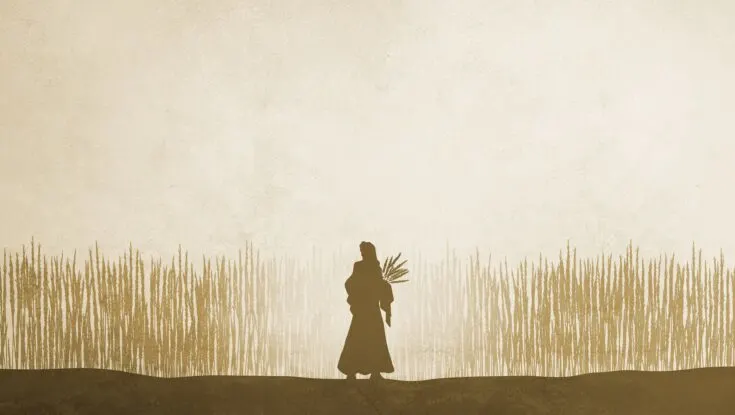In this article, we will study who is Ruth in the Bible and look deep into this wonderful woman in scripture. So, get your Bible, and let’s dive in…
The book of Ruth is only a few chapters in the Bible. One could read it in less than 10 minutes. But this doesn’t mean it isn’t packed full of gold nuggets that we can glean from.
Ruth is an encouraging story of hope and victory over dire circumstances. Very simplistically, that could summarize the story in the book of Ruth. But looking deeper, you can find some noble attributes in the characters of this book: the three most key beings, Naomi, Ruth, and Boaz.
Naomi must have been an excellent role model for her daughters-in-law, Ruth and Orpha. She cared for her deeply.
And we can describe Ruth as kind, loyal, courageous, modest, and hardworking. All of these would be accurate statements. However, there is so much more to Ruth than meets the eye at first glance.
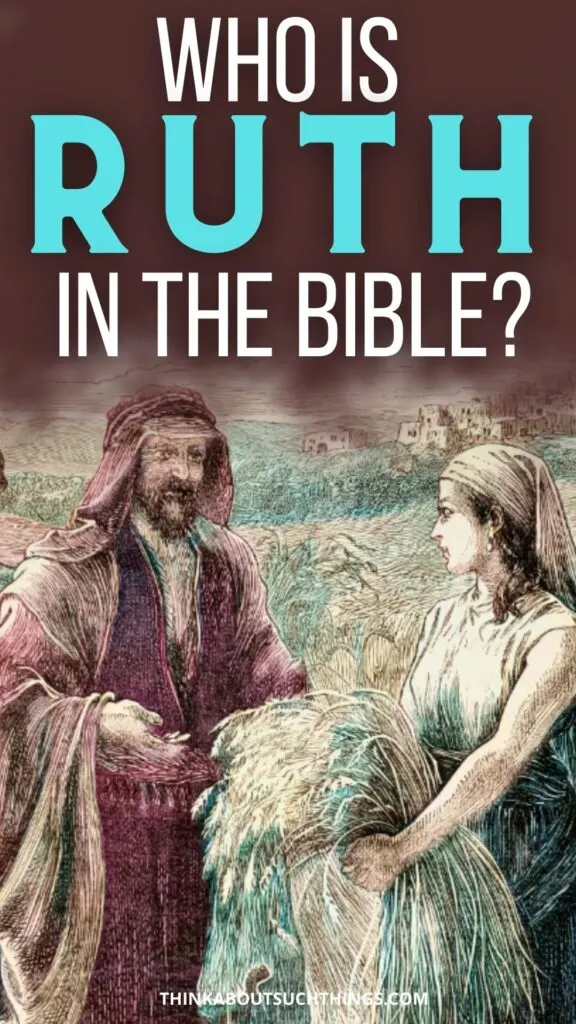
To truly understand the book of Ruth and to understand who Ruth is in the Bible requires some study. We will need some knowledge of a few of the laws given to Moses and the day’s customs to round out your understanding of the book of Ruth.
This really helps us grasp what is going on in the story.
We will also better understand how Ruth represents who we are. And Interestingly enough, Ruth also takes us into the throne room and explains some events in Revelation.
Table of Contents
Who Is Ruth In The Bible?
Are you ready to join this interesting journey to uncovering who Ruth is in the Bible? We will review five key pieces of information that speak of who she was and how her role hugely affects us even today!
This young lady who experienced such great loss was not forgotten by God. He picked her up from the ashes of mourning and redeemed her 100-fold.
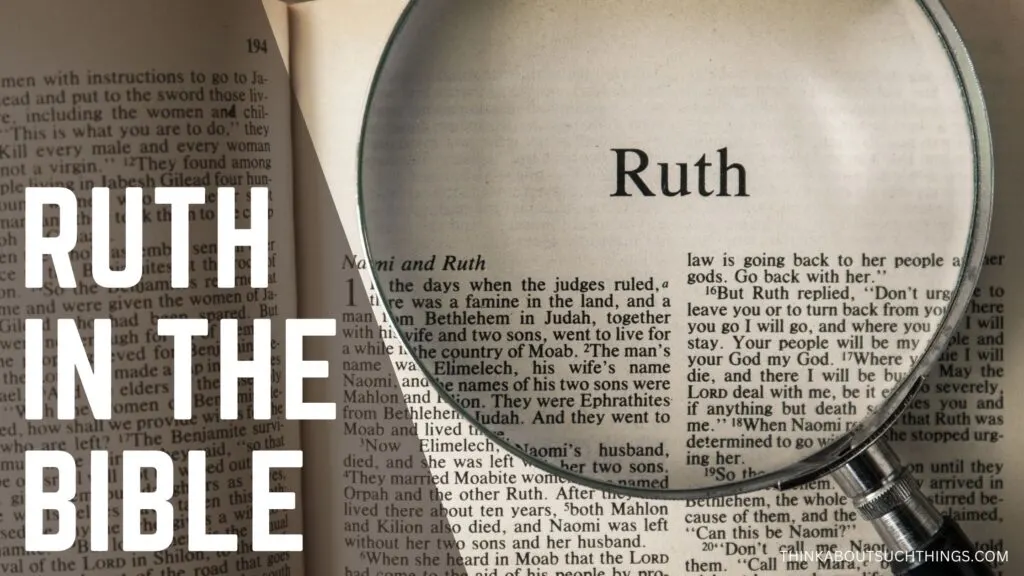
What Does the Name Ruth Mean?
Historically, the name Ruth has been associated with compassion and loyalty, with its Old Testament connection. But when we look at the Hebrew origin of the name Ruth can be translated to mean ‘friend’ or ‘companion.’
And in many ways she was a great friend and loyal companion to Naomi. When she had lost everything Ruth stood by her and even when things got better in Ruth was still there.
רוּת Rûwth, rooth; probably for H7468; friend; Ruth, a Moabitess:—Ruth.
Ruth In The Bible: The Widow From A Foreign Country
Throughout God’s Word, we find that God cares for widows. He instructs His people to follow His example by caring for those who cannot care for themselves. In the first chapter of Ruth, we see how Naomi and her daughters-in-law all become widowed. Naomi hears reports that there is no longer a famine in her country of origin.
Naomi is a foreigner in Moab with no rights and no provisions. She had heard there was no longer famine in her home country, which gave her hope. More importantly, she knew God’s laws provided for her as a widow.
Ruth chooses to accompany Naomi on the dangerous trip to Bethlehem. The reasoning is not clear, perhaps Ruth loved Naomi like a mother or maybe Ruth had nothing to return to. But she was willing to give up everything she knew to follow Naomi.
But Ruth said, “Do not urge me to leave you or to turn back from following you; for where you go, I will go, and where you lodge, I will lodge. Your people will be my people, and your God, my God. – Ruth 1:16 AMP
Whatever the reasoning it was an act of loyalty that would make Ruth a foreigner in Bethlehem.
Ruth In The Bible: The Loyal Convert
Ruth chose to turn her back on the worship of the deity Chemosh and, in a moving statement, proclaimed both her loyalty to Naomi and her faith in the LORD God.
She vows to go wherever Naomi does, to live where Naomi does, to accept Naomi’s kin folk as her own, and to serve God faithfully. Ruth promises that this vow before God is unto death.
When Ruth and Naomi left Moab, they did so empty-handedly. Their only hope was in God and His faithfulness toward them. That is faith and trust in action.
Ruth In The Bible: The Stranger And God’s Law Of Gleaning
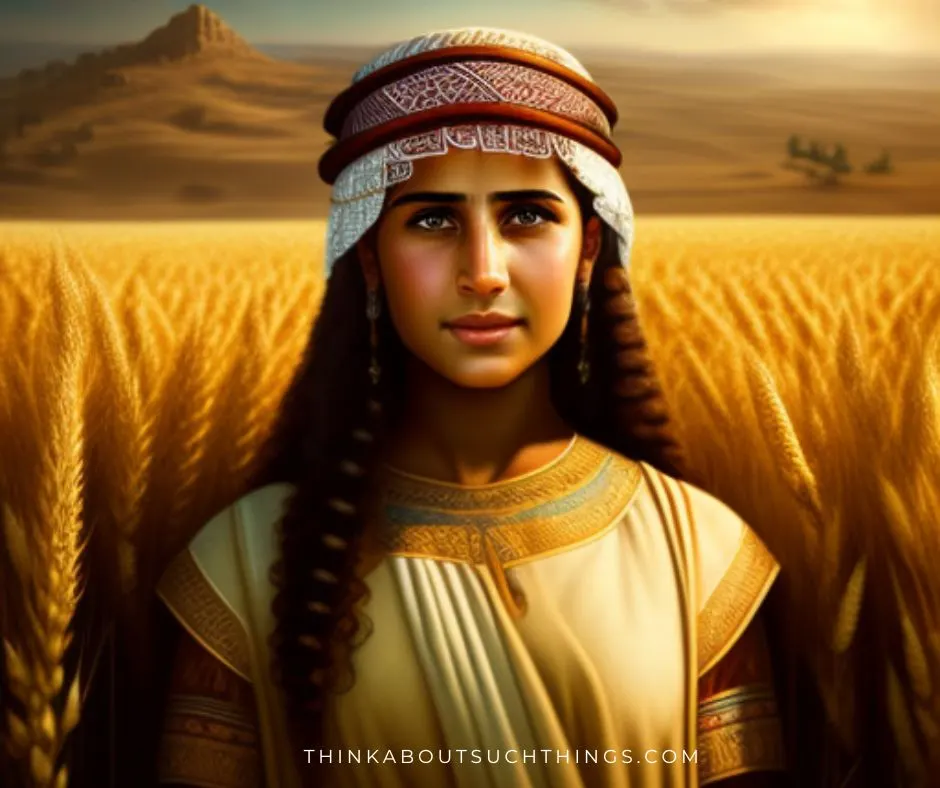
After enduring a roughly sixty-mile trip, Ruth and Naomi arrived in Bethlehem during the spring, during the barley harvest.
Naomi knows God’s laws of gleaning are a means for her and Ruth to survive. In Deuteronomy 24:19-21 we learn more about this law and why it was such good news.
In effect, the law of gleaning is God’s welfare system. It ensures that foreigners in the land, those orphaned, and widows may work to collect food from each field’s harvest.
Ruth listen to Naomi and showed her care for her by collecting the gleanings of the barley harvest as provision for both them.
Ruth In The Bible: The Modest Servant
10 So she fell on her face, bowed down to the ground, and said to him, “Why have I found favor in your eyes, that you should take notice of me, since I am a foreigner?” 11 And Boaz answered and said to her, “It has been fully reported to me, all that you have done for your mother-in-law since the death of your husband, and how you have left your father and your mother and the land of your birth, and have come to a people whom you did not know before.
12 The Lord repay your work, and a full reward be given you by the Lord God of Israel, under whose wings you have come for refuge.”13 Then she said, “Let me find favor in your sight, my lord; for you have comforted me, and have spoken kindly to your maidservant, though I am not like one of your maidservants.” – Ruth 2:10-13 NKJV
Ruth distinguishes herself by her hard work and modesty. Ruth again shows her true conversion to God by not exhibiting the seductive characteristics usually associated with Moabites.
Instead, her work ethic catches the landowner’s attention. In chapter two, she introduces and identifies herself as a foreigner and a servant or handmaiden.
Ruth does not do this to gain pity. Rather she shows reverence and gratitude to Boaz, her benefactor. Ruth shows care for Naomi by working hard, and in return, Boaz provides protection and provision over and above what the law states is required. Boaz grants Ruth permission to glean from his fields for the remainder of the harvest.
God’s Laws For Restitution Of Land
To understand the remaining two chapters of this short book, we need to be familiar with more Hebrew laws.
- The law of redemption (Leviticus 25:47-55) The law of redemption allows lost land to be returned to the original owner via a relative.
- The law of levirate marriage (Deuteronomy 25:5-10).
When the Israelites entered the promised land, each family received land. This land belonged to God, and the terms of use for each family were similar to what we know as a lease.
Any sale of land would be annulled in the year of Jubilee or could be reversed if a close family member redeemed the property. The family member was called a kinsman-redeemer.
As part of restoring the title deeds to a widow who had no son to pass the land on to, the law of levirate marriage was part of the obligations of a kinsman-redeemer. In addition, the kinsman-redeemer needed to be willing and able to perform all the tasks of this position.
To conclude the transaction, the terms are inscribed on the back side of the title deeds, and the scroll is sealed. We see an example of such a transaction in Jeremiah 32: 6-14.
The Hope Of Restitution For Naomi
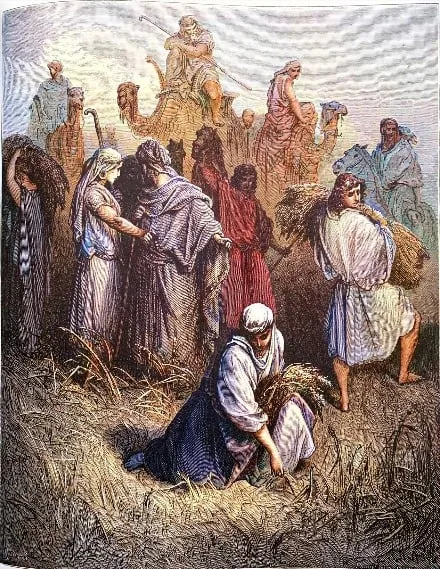
Boaz, the land owner where Ruth had been gleaning, was a kinsman of Naomi’s late husband, Elimelech. Naomi will have a home and a future if Boaz is prepared to redeem the land for her.
In addition, if Boaz were prepared to enter into a levirate marriage with Ruth, a son born from that union would continue Naomi’s bloodline and ensure that the land remained in the family.
Naomi explains to Ruth how God’s laws provide hope and a future for them and how to request that Boaz fulfill this role as a kinsman-redeemer for them. Boaz is willing to fulfill this role but must ensure the legalities are met. A closer family member also had a claim to the title, so Boaz convened a council of ten elders and offered the right of redemption to him.
The other kinsman was prepared to redeem the land but not to fulfill the levirate marriage, as it would mean that Ruth’s son would be named Naomi’s heir.
The land investment would fall to the heir, not the redeemer. This left Boaz free to fulfill the role of Kinsman-redeemer. Ruth and Naomi’s land were bought at a price by this self-sacrificing act of Boaz.
Ruth, The Gentile Bride In The Royal Bloodline
There is such a beautiful tapestry of hope and promise woven into the story of Ruth. God’s faithfulness and provision to make the events in this book play out started hundreds of years before.
Almost seven hundred years before the events in Ruth, God saved Lot and his family from Sodom before its destruction. Ruth is a decedent of Lot the nephew of Abraham.
Likewise, Boaz’s bloodline includes the miraculous preservation and conversion of his mother, Rahab, during the destruction of Jericho. God wove a beautiful promise into Boaz’s history a few generations earlier when Tamar, a gentile like Ruth, continued Judah’s bloodline by levirate marriage.
How does this impact Ruth and each one of us today?
The way prophecy works in the Old Testament is by showing what will be done by what has already been done. God says that He knows the outcome from the beginning (Isa 46:9-11). God also repeats patterns to show us His plans (Ecclesiastes 1:9).
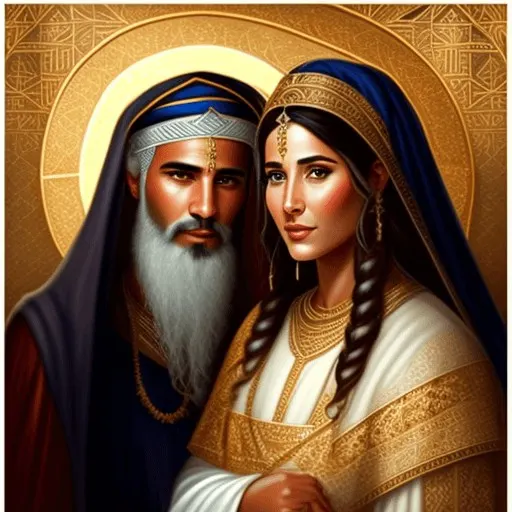
From the moment Adam entered into sin and made mankind and GOD’s creation subject to the sickness and corruption. GOD was weaving a plan of redemption for His creation. God set the terms in His Laws to ensure it is legally binding.
Then God showed us how His mercy, in addition to the law, saved those who chose Him as their salvation.
Ruth, as a gentile woman, was included in God’s redemption plan by levirate marriage. This marriage entailed a legal transaction and financial payment and was often at the expense of one’s own plans.
Ruth chose to leave everything she knew, her family, her comfort, her past life of idol worship behind and serve God to take care of Naomi.
She chose to marry Boaz rather than a younger man because it would redeem a future for her and Naomi, not just for herself.
Boaz ensured that he followed the law in order to ensure a future for Ruth and Naomi. He knew there was no financial gain for him. Everything he paid was for the benefit of Ruth and Naomi, but also for us.
Ruth and Boaz have a son named Obed, king David’s grandfather. Ultimately, Jesus is born from this bloodline! How amazing is that? God wove such a beautiful story of redemption.
Ruth Is A Symbol Of Hope For Christians Today
Here, we see the similarity between Ruth and the Christian church turning from our sinful past to serve God. As born-again believers, we were bought with the price of the blood of Jesus. We were not born into salvation.
Like Ruth, we need to choose Jesus as our Kinsman-redeemer and ask Him into our life to fulfill that role for us.
Ruth shows us that we must be diligent, hardworking, kind, and compassionate. We must be willing to do God’s work by being His servants on earth. We may glean a bountiful harvest from God’s provisions as a reward.
Symbolically, Boaz represents Jesus in this story. The Kinsman-redeemer, who has the means to save us and is willing to do so. The price to redeem all that was lost was high, but Jesus was willing to pay the ultimate price to redeem not only His people but also a gentile bride and the earth.
God has taken back the title deeds to the world. In Revelation 5, we see Him holding the sealed scroll with the terms of purchase written on the outside. No wonder John wept when he thought there was no one found to open the scroll. Thankfully, when Jesus came to earth, He became a Kinsman. By paying for our sins on the cross, He proved that He was willing and able to redeem us.
What a beautiful story of God’s love for us. We see a hard-won victory and self-sacrifice in Jesus’ work on the cross. What a glorious promise, knowing that our Kinsman-redeemer holds the title deeds that restore to us, both Jew and gentile, the future God always intended for us.
More On The Book Of Ruth
Are you interested in learning more from the book of Ruth? Well, hold tight — I have you covered! If you want to go deeper into this captivating book, I have written several articles you might enjoy.
The Book of Ruth
Uncovering the Mystery of Ruth in the Bible: Who Was She Really?
I hope you have enjoyed this article on who is ruth in the Bible and would like to leave a comment. You can do so below! I love hearing from my readers and what they are learning.

Melissa is a passionate minister, speaker and an ongoing learner of the Bible. She has been involved in church and vocational ministry for over 18 years. And is the founder of Think About Such Things. She has the heart to equip the saints by helping them get into the Word of God and fall more in love with Jesus. She also enjoys family, cooking, and reading.
She has spoken in churches in California, Oregon, Texas, and Mexico and has been featured in Guidepost Magazine and All Recipes Magazine. Read More…

